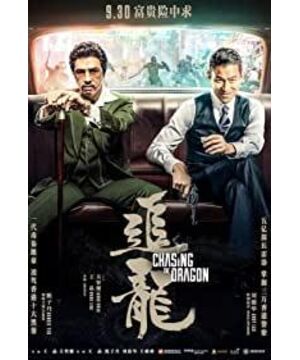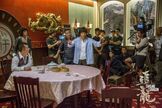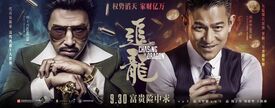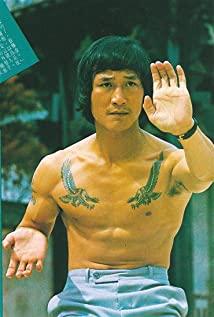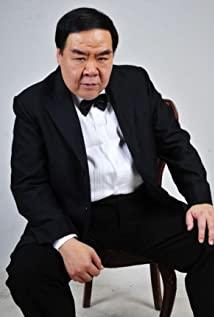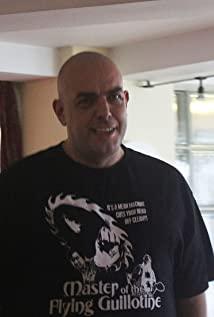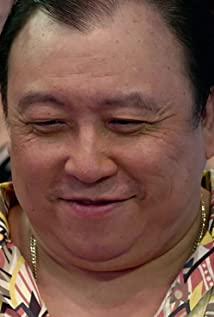Chasing the Dragon, as the name implies, is a slang term that cannot be used on the table. It is like the remake of Hong Kong director Tsui Hark's "Lin Hai Xue Yuan" by military writer Qu Bo, in which our army's resourceful investigator Yang Zirong first got involved in the bandit chief" When it was the nest of a mountain eagle, a series of "Heavenly Kings Covering Earth Tigers" and "Pagoda Town River Demons" seemed out of bounds, but in reality, they were like swordsmen, all of which had already been pointed and hidden.
Of course, in the slang words of experts in the three eastern provinces, most of the bandits were called "beards" or "locks", and the leaders with bull ears similar to "mountain eagles" should also be called "big shopkeepers" "I believe that here is one or two of you all. The film "Chasing the Dragon", shot by Hong Kong director Wang Jing, is about the famous or notorious Hong Kong Island that has not returned to the embrace of the motherland in the last century. The story of Wu Xihao, a drug lord known as "Hao", so you can probably guess the meaning of the word "chasing the dragon".
However, at present, these are generally inconvenient to describe in the text, at least at this moment in front of the computer to endure the discomfort caused by the crappy keyboard, but still my fingers are flying, I dare not do it anyway This crab-eater can only follow certain relevant laws and regulations and thus vaguely say that the so-called "chasing the dragon" is a kind of self-satisfaction for some addicts. It's just a self-created way of smoking after being bored.
Spread the white powder on the table, and the expert will use a bank card to carefully crush the powder of the remaining crystals one by one. This process needs to be meticulous, so that the After the subsequent process, I got the feeling of falling into the clouds and mist, and I felt like a fairy, and then I used the bank card in my hand to arrange these fine powders on the transparent table into a sinuous white dragon. , At this time, those drug addicts who have long been drooling will come forward, as if the Japanese would go forward and look carefully when they eat the famous "female body banquet", and use one nostril, He inhaled the long white dragon into his nasal cavity with all his might, and then sneezed lightly. In the hands of experts, he called it "chasing the dragon".
This way of "chasing the dragon" also has different names in different regions. For example, in Sichuan and other places, it will be called "eating meat", and even this kind of thing will be called vaguely. It is "meat", and the experts who understand it will naturally be able to see through the mystery at a glance, but the people who don't know it will naturally not know the reason.
It's just that the film "Chasing the Dragon" is not a propaganda film to popularize the law, not to mention that Wang Jing, who has always been far ahead in business acumen among Hong Kong directors, and who speaks bluntly that he loves money, will not risk the world. It does not violate the "dragon" that will appear at the beginning of most Hong Kong films since 1997, which represents the golden "dragon" that is life and death to seize power, and the title of "Chasing the Dragon", we can experience more It is a memory of director Wang Jing for the past Hong Kong and Hong Kong feelings.
What's more, the film "Chasing the Dragon" tells the story of Wu Xihao, a notorious drug lord in Hong Kong in the last century. This man was originally born in Shantou, Guangdong, and was at the bottom of the begging for food in Hong Kong, which was once a British colony. However, in the end, relying on his relationship with Lu Le, the then Chinese chief detective who was known as the "500 million detective", he became the "earth emperor" who monopolized Hong Kong's underground industry with one hand and covered the sky. No two, so far, it is also an incredible legend of heroes.
Although Wu Xihao and Lu Le, with the establishment of Hong Kong's Independent Commission Against Corruption (ICAC), have been imprisoned for 30 years, and the other has gone to Canada, never set foot in Hong Kong's land for life, and become victims of Hong Kong's dark history, but this kind of belt How can a legendary story be let go by the Hong Kong film industry, which always aims to entertain the public, so the images of Wu Xihao and Lu Le have been on the big screen more than once before the film "Chasing the Dragon". Appeared.
Among them, the ones with pearls and jades are produced by the famous Hong Kong filmmaker MacDangxiong, who once produced the "Daquanzai" series of "Province and Hong Kong" series, and starred by Lv Liangwei, Ye Tong, Zheng Zeshi and others. The film "The Lame Man", and "The Legend of 500 Million Inspector Lei Luo" played by Andy Lau. And among them, "Lime Hao" is the most well-known to the public.
Like the film "Chasing the Dragon", the film "The Lame Man" also tells the story of the fortune of a generation of hero Wu Xihao. Among them, Wu Xihao, who was born in Chaoshan, played by Lv Liangwei, from the initial wandering on the streets, and then to the later all-powerful situation, the performance has won. Let it go, a heroic character who was born from the bottom, although ruthless, but always attaches great importance to love and righteousness, is portrayed in a three-pointed way, which is unforgettable, and many of the supporting roles, whether it is played by Zheng Zeshi. Fat Bo, or Lv Le, the Chinese chief inspector who covers the sky with one hand, played by the old drama bone Zeng Jiang, all have very different personalities, and they complement each other with the protagonist Lv Liangwei, which is perfect.
What's more, the overall tone of the film is extremely heavy, which not only condenses the vicissitudes of the times, but also depicts the rise and disintegration of a soprano family like "The Godfather" in great detail. Everyone's sense of fate in the context of the times can be called an unsurpassed milestone in the history of Hong Kong film gangster films.
And I believe that when you are familiar with the tone of "The Lame Man" and look at Wang Jing's "Chasing the Dragon" with the same eyes, I believe that most of them will burst into laughter, which seems to be a work like playing a family.
First of all, Donnie Yen, who played Wu Xihao in "Chasing the Dragon", was "the daughter-in-law of many years and finally became a mother-in-law." After appearing to have no desires and no desires, Donnie Yen seems to be the "double-flowered big red stick" of Hong Kong action films, but Donnie Yen was born with a slightly stiff, unsmiling face. On top of the skill of the lines, it is really poor. Even in "Chasing the Dragon", he rescued the detective Lai Luo played by Andy Lau because of the importance of love and righteousness, so he broke his leg and had a beard overnight. It became a matter of words. People's "lame man", but it is difficult to hide his lack of performance in performance.
So the audience sees Wu Xihao played by Donnie Yen in "Chasing the Dragon" most of the time. Between his gestures, he always brings a pair of "Ye Zongshi" who was born in a big family and strolls in the courtyard under pampering. Tolerance is the rapid rotation of the camera in the street melee, as if the next second can use modern advanced ground technology to make the enemy's noose unable to move, but because he went to the wrong studio, he looked like he was tied up again. This is not only far from the arrogant and domineering character in "The Lame Man" played by Lu Liangwei, who is naturally looking forward to flying with his hands and feet, but is also far from the "500 million detective" Lu Le played by Andy Lau. far.
Not only that, aside from Donnie Yen's almost clumsy acting skills, even with the connections of director Wang Jing and Wang Jing in "Chasing the Dragon", many stars such as Huang Rihua, Zeng Jiang, and Zheng Zeshi were invited to participate in the performance. But this also hardly conceals the perfunctory production of the film as a whole.
Compared with the turbulent era of the last century created by McDonald's and Pan Wenjie in "The Lame Man", the film "Chasing the Dragon" has a kind of violation of modern fashion films at first glance. I feel that Donnie Yen and his brothers are more like Yu Qian and the old man who are keen on "smoking, drinking, and perming their heads", wearing a wig and performing lively on the street in the small scene of the film and television city, and they were able to play with Wang. Jing and her always ambiguous female apprentice Meng Yao's aesthetics, whether the protagonist in "Chasing the Dragon", or a kind of actress in the group, Wu Yi is not a face of hyaluronic acid, so that Wu Xihao is actually there. In a desperate situation, he could pierce the face of the silicone bag on his chest without bowing his head, to kill a bloody path. And the fake "net celebrity faces" of these actresses allow the audience to experience the gangster addiction of the last century in a vivid way.
What's more, in addition to the congenital deficiencies in the actor's performance and casting, director Wang Jing seems to have long been accustomed to his own set of "high-yield like a sow" filming routine. The scheduling and scene settings in the film are also very perfunctory. Sometimes there are huge loopholes in the film whether it is the scene or the object. Even on the background of the actor's bed scene, the audience can easily find the bed. The splendid background wall that only existed after the 1990s, compared to the "Lame Man" producer, McDonnell, who tricked the star Shen Wei into the car when he was filming "Provincial and Hong Kong Flag Soldiers" and began to set fire to it. Wang Jing is too perfunctory to burn the car with a strict attitude towards details.
Of course, although "Chasing the Dragon" has many congenital defects, and even the textbook "Crippled Man" is too pediatric, but in the context of today's era of "prostitution, gambling and drugs" taboo, Wang Jing dared to come up with Such a film with a sensitive subject matter can still vaguely allow the audience to find some indifferent "Hong Kong flavor" that only existed in the golden age of Hong Kong movies in the last century, which is still commendable.
"Book of Changes" has a saying that "Dragon fights in the wild, its way is poor", but unfortunately the dragon chased by "Chasing the Dragon" has not exerted its due potential, which has to be said to be a kind of big era. Sorry.
View more about Chasing the Dragon reviews


